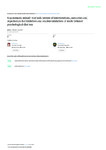A systematic mixed-methods review of interventions, outcomes and experiences for midwives and student midwives in work-related psychological distress
| dc.contributor.author | Pezaro, S | |
| dc.contributor.author | Clyne, Wendy | |
| dc.contributor.author | Fulton, EA | |
| dc.date.accessioned | 2020-09-15T09:21:15Z | |
| dc.date.available | 2020-09-15T09:21:15Z | |
| dc.date.issued | 2017-07-01 | |
| dc.identifier.issn | 0266-6138 | |
| dc.identifier.issn | 1532-3099 | |
| dc.identifier.uri | http://hdl.handle.net/10026.1/16321 | |
| dc.description.abstract |
BACKGROUND: within challenging work environments, midwives and student midwives can experience both organisational and occupational sources of work-related psychological distress. As the wellbeing of healthcare staff directly correlates with the quality of maternity care, this distress must be met with adequate support provision. As such, the identification and appraisal of interventions designed to support midwives and student midwives in work-related psychological distress will be important in the pursuit of excellence in maternity care. OBJECTIVES: to identify interventions designed to support midwives and/or student midwives in work-related psychological distress, and explore any outcomes and experiences associated with their use. Data sources; study eligibility criteria, participants, and interventions This systematic mixed-methods review examined 6 articles which identified interventions designed to support midwives and/or student midwives in work-related psychological distress, and reports both the outcomes and experiences associated with their use. All relevant papers published internationally from the year 2000 to 2016, which evaluated and identified targeted interventions were included. STUDY APPRAISAL AND SYNTHESIS METHODS: the reporting of this review adhered to the Preferred Reporting Items for Systematic Reviews and Meta-analyses (PRISMA) guidelines. The quality of each study has been appraised using a scoring system designed for appraising mixed-methods research, and concomitantly appraising qualitative, quantitative and mixed-methods primary studies in mixed reviews. Bias has been assessed using an assessment of methodological rigor tool. Whilst taking a segregated systematic mixed-methods review approach, findings have been synthesised narratively. FINDINGS: this review identified mindfulness interventions, work-based resilience workshops partnered with a mentoring programme and the provision of clinical supervision, each reported to provide a variety of both personal and professional positive outcomes and experiences for midwives and/or student midwives. However, some midwives and/or student midwives reported less favourable experiences, and some were unable to participate in the interventions as provided for practical reasons. LIMITATIONS: eligible studies were few, were not of high quality and were limited to international findings within first world countries. Additionally, two of the papers included related to the same intervention. Due to a paucity of studies, this review could not perform sensitivity analyses, subgroup analyses, meta-analysis or meta-regression. CONCLUSIONS AND IMPLICATIONS OF KEY FINDINGS: there is a lack of evidence based interventions available to support both midwives and student midwives in work-related psychological distress. Available studies reported positive outcomes and experiences for the majority of participants. However, future intervention studies will need to ensure that they are flexible enough for midwives and student midwives to engage with. Future intervention research has the opportunity to progress towards more rigorous studies, particularly ones which include midwives and student midwives as solitary population samples. | |
| dc.format.extent | 163-173 | |
| dc.format.medium | Print-Electronic | |
| dc.language | en | |
| dc.language.iso | en | |
| dc.publisher | Elsevier BV | |
| dc.subject | Midwives | |
| dc.subject | Job satisfaction | |
| dc.subject | Employee assistance programs | |
| dc.subject | Burnout, Professional | |
| dc.subject | Systematic review | |
| dc.subject | Stress, Occupational | |
| dc.title | A systematic mixed-methods review of interventions, outcomes and experiences for midwives and student midwives in work-related psychological distress | |
| dc.type | journal-article | |
| dc.type | Journal Article | |
| dc.type | Review | |
| dc.type | Systematic Review | |
| plymouth.author-url | https://www.webofscience.com/api/gateway?GWVersion=2&SrcApp=PARTNER_APP&SrcAuth=LinksAMR&KeyUT=WOS:000405376500023&DestLinkType=FullRecord&DestApp=ALL_WOS&UsrCustomerID=11bb513d99f797142bcfeffcc58ea008 | |
| plymouth.volume | 50 | |
| plymouth.publication-status | Published | |
| plymouth.journal | Midwifery | |
| dc.identifier.doi | 10.1016/j.midw.2017.04.003 | |
| plymouth.organisational-group | /Plymouth | |
| plymouth.organisational-group | /Plymouth/Faculty of Health | |
| plymouth.organisational-group | /Plymouth/Faculty of Health/Peninsula Medical School | |
| plymouth.organisational-group | /Plymouth/REF 2021 Researchers by UoA | |
| plymouth.organisational-group | /Plymouth/REF 2021 Researchers by UoA/UoA03 Allied Health Professions, Dentistry, Nursing and Pharmacy | |
| plymouth.organisational-group | /Plymouth/Users by role | |
| plymouth.organisational-group | /Plymouth/Users by role/Academics | |
| dc.publisher.place | Scotland | |
| dcterms.dateAccepted | 2017-04-11 | |
| dc.rights.embargodate | 2020-10-15 | |
| dc.identifier.eissn | 1532-3099 | |
| dc.rights.embargoperiod | Not known | |
| rioxxterms.versionofrecord | 10.1016/j.midw.2017.04.003 | |
| rioxxterms.licenseref.uri | http://www.rioxx.net/licenses/all-rights-reserved | |
| rioxxterms.licenseref.startdate | 2017-07-01 | |
| rioxxterms.type | Journal Article/Review |


